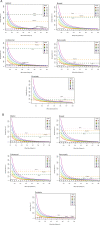Racial and ethnic disparities in a real-world precision oncology data registry
- PMID: 36658153
- PMCID: PMC9852424
- DOI: 10.1038/s41698-023-00351-6
Racial and ethnic disparities in a real-world precision oncology data registry
Abstract
Biorepositories enable precision oncology research by sharing clinically annotated genomic data, but it remains unknown whether these data registries reflect the true distribution of cancers in racial and ethnic minorities. Our analysis of Project Genomics Evidence Neoplasia Information Exchange (GENIE), a real-world cancer data registry designed to accelerate precision oncology discovery, indicates that minorities do not have sufficient representation, which may impact the validity of studies directly comparing mutational profiles between racial/ethnic groups and limit generalizability of biomarker discoveries to all populations.
© 2023. The Author(s).
Conflict of interest statement
S.C.K. reported having a spouse who is employed by Sanofi Genzyme and receipt of grants from the Prostate Cancer Foundation outside the submitted work. E.V.A. reported advisory and consulting work for Tango Therapeutics, Genome Medical, Invitae, Enara Bio, Janssen, Manifold Bio, and Monte Rosa; he reported research support from Novartis, BMS; he reported equity in Tango Therapeutics, Genome Medical, Syapse, Enara Bio, Manifold Bio, Microsoft, and Monte Rosa; he received travel reimbursement from Roche/Genentech; and he filed institutional patents on chromatin mutations and immunotherapy response and methods for clinical interpretation outside the submitted work. F.H. reported equity in GlaxoSmithKline. No other disclosures were reported.
Figures


References
-
- Consortium APG, et al. AACR Project GENIE: powering precision medicine through an international consortium. Cancer Discov. 2017;7:818–831. doi: 10.1158/2159-8290.CD-17-0151. - DOI - PMC - PubMed
LinkOut - more resources
Full Text Sources

